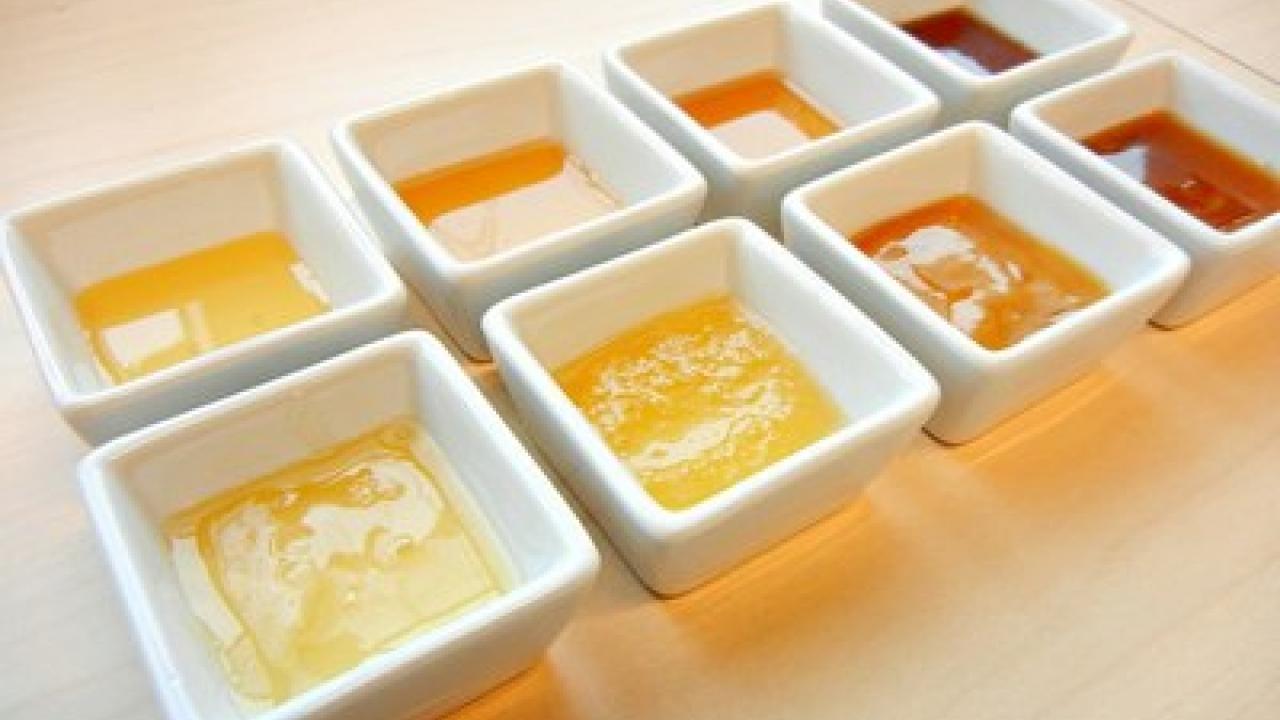
April 1, 2016: Honey Sensory Experience Debuts at UC Davis
For immediate release:
April 1, 2016
Contact: Amina Harris, Director Honey and Pollination Center
Robert Mondavi Institute, UC Davis
530-754-9301
“Varietal honey is popular right now. Really popular,” explains Amina Harris, Director of the Robert Mondavi Institute Honey and Pollination Center at UC Davis. Two years ago, the Center published the Honey Flavor and Aroma Wheel to wide acclaim. Since then, Harris has been promoting honey and honey pairings through varietal tastings all over California.
On Friday and Saturday, May 20 and 22, 2016, participants will learn about the sensory analysis of honey by tasting more than two dozen honeys selected from all over the world. In addition, UC Davis research on bee health and honey nutrition, aroma and pollen analyses will be presented. Other topics to be discussed include honey health benefits, labeling, history, and cooking. .
The short course will feature sensory scientist Sue Langstaff, of Applied Sensory, LLC, who has recently expanded her expertise from olive oil, beer and wine to honey. Langstaff began working with Harris when they convened a 26-person taste panel for the creation of the Honey Flavor Wheel.
Gian Luigi Marcazzan, President of the Italian Register of Experts in the Sensory Analysis of Honey, will join Langstaff. Marcazzan’s program, based in Bologna, Italy, has been training and certifying tasters in all aspects of Italian varietal honeys for over twenty years.
Langstaff, Harris and Orietta Gianjorio created this course specifically for the American palate. Orietta, well-known throughout California as a professional taster of olive oil, wine and chocolate, is very excited to add honey to her growing list of areas of expertise. “Bringing a course of this caliber to UC Davis is very exciting. We are helping to expand our knowledge about honey by bringing so many experts together,” said Gianjorio.
Consumer interest in a sustainable and natural food supply is growing in the United States and globally and along with it, the consumption of honey. There is significant confusion concerning what constitutes a varietal honey and what that honey should taste like. According to Langstaff, who has developed sensory protocols for olive oil, “Rather than relying on label descriptions, participants will learn to describe the sensory properties of honey and be able to differentiate honeys of various varieties.”
“Anyone involved in honey should consider coming to this ground breaking course,” says Harris. “As the retail marketplace expands honey offerings, they should know what to look for. Local is important, but so is quality. We can’t always rely on the two to coincide.”
The Honey Sensory Experience is an essential course directed towards the professional buyer, importer, category manager, producer, packer, baker, candy maker and those simply interested in honey and learning more about it.
Those interested in further information about tasting honey can sign up for a Sunday morning Master Class with Gian Luigi Marcazzan who will provide an in depth presentation of the Italian certification series he oversees.
Additional course instructors include nutritionist, Amy Myrdal Miller, Farmers Daughter Consulting, Mani Niall, chef and ‘head cupcake froster’ at Sweet Bar Bakery in Oakland, members of the UC Davis faculty and a representative of the National Honey Board.
To register for this experience visit: http://honey.ucdavis.edu/events/honey-sensory-experience. Fees for the two day experience is $600. $675 after April 18th. The Master class with Gian Luigi Marcazzan is $175. Contact Amina Harris: aharris@ucdavis.edu.
The Honey and Pollination Center is a Center of Excellence at the Robert Mondavi Institute for Wine and Food Science at UC Davis, a $100 million state-of-the-art research and teaching facility that is also home to two world-renowned academic departments, Viticulture and Enology, and Food Science and Technology. The Center’s mission is to help UC Davis become the world's leading authority on bee health, pollination and honey quality"
Located near the California state capitol in Sacramento, UC Davis has more than 35,000 students, and the full-time equivalent of 4,100 faculty and other academics and 17,400 staff. The campus has an annual research budget of over $700 million, a comprehensive health system and about two dozen specialized research centers. The university offers 96 programs and 104 undergraduate majors in four colleges and six professional schools.
